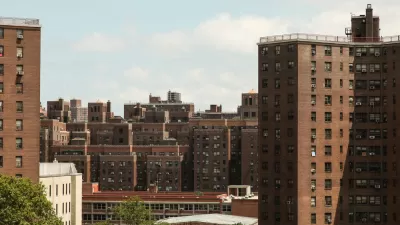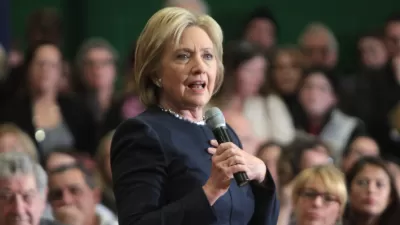Donald Trump's first major economic speech showed significant changes, including how he'd pay for his hefty infrastructure plan. Both he and Hillary Clinton will likely be relying on the same funding source.
It was only last week that Donald Trump told Fox Business that he'd pay for his $500 billion infrastructure plan through borrowing. Like many positions and declarations coming from the billionaire's campaign, it didn't last long.
Trump unveiled his economic plan Monday at the Detroit Economic Club, adopting GOP tax cuts.
"He also says he wants U.S. companies to repatriate their foreign cash, proposing a one-time tax holiday that would allow them to pay just 10 percent to bring their cash home," reports Patti Domm, CNBC executive news editor. "That money would be used to pay for infrastructure."
The tax should sound familiar. Both House Speaker Paul Ryan (R-Wis.), Sens. Barbara Boxer (D-Cali.) and Rand Paul (R-Ky.), and President Obama looked to the same source to fund their transportation reauthorization packages, though they used different forms of it. Ultimately, neither was used to fund the FAST Act.
"[Both Trump and Clinton] could look to the repatriation tax holiday for the $2 trillion stashed overseas to cover some of the costs of their proposed infrastructure spending, according to Dan Clifton, head of policy research at Strategas.
Like the FAST Act approved last December, it's Congress that ultimately writes and approves spending bills.
Clinton also proposed an infrastructure bank to help fund her plan, dissected here.
There are major differences between the two candidate's infrastructure plans, reported Domm on July 28.
Both candidates want to boost infrastructure spending, with the Republicans more focused on roads and bridges than mass transit. Clinton, on the other hand could be more favorable for railroads.
Differences also compared on The Transport Politic via Planetizen.
FULL STORY: Clinton, Trump both would build infrastructure, likely pay for it the same way

Planetizen Federal Action Tracker
A weekly monitor of how Trump’s orders and actions are impacting planners and planning in America.

Congressman Proposes Bill to Rename DC Metro “Trump Train”
The Make Autorail Great Again Act would withhold federal funding to the system until the Washington Metropolitan Area Transit Authority (WMATA), rebrands as the Washington Metropolitan Authority for Greater Access (WMAGA).

The Simple Legislative Tool Transforming Vacant Downtowns
In California, Michigan and Georgia, an easy win is bringing dollars — and delight — back to city centers.

Albuquerque’s Microtransit: A Planner’s Answer to Food Access Gaps
New microtransit vans in Albuquerque aim to close food access gaps by linking low-income areas to grocery stores, cutting travel times by 30 percent and offering planners a scalable model for equity-focused transit.

This City Will Pay You to Meet Your Neighbors
A North Kansas City grant program offers up to $400 for residents to throw neighborhood block parties.

Commentary: Our Silence Will Not Protect Us
Keeping our heads down and our language inoffensive is not the right response to the times we’re in. Solidarity and courage is.
Urban Design for Planners 1: Software Tools
This six-course series explores essential urban design concepts using open source software and equips planners with the tools they need to participate fully in the urban design process.
Planning for Universal Design
Learn the tools for implementing Universal Design in planning regulations.
Smith Gee Studio
City of Charlotte
City of Camden Redevelopment Agency
City of Astoria
Transportation Research & Education Center (TREC) at Portland State University
US High Speed Rail Association
City of Camden Redevelopment Agency
Municipality of Princeton (NJ)





























